Moving To Mexico
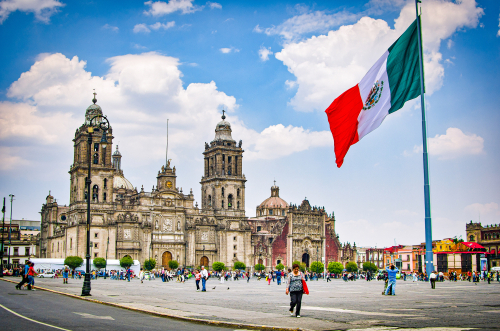
Why Move to Mexico?
Mexico is a top destination for Americans seeking a more affordable lifestyle, adventure, or a fresh start. With its warm weather, rich culture, delicious cuisine, and close proximity to the U.S., it appeals to retirees, digital nomads, and families alike.
This guide provides everything you need to know about relocating to Mexico, including the best cities to live in, how to handle visas, healthcare, housing, and finances, ensuring a smooth and stress-free move.
- Why Mexico is Ideal for Expats
- Pro Tips for Choosing Your Location
- Navigating Life in Mexico
- Frequently Asked Questions About Moving to Mexico
- Your New Life Awaits in Mexico
- Sign up to Overseas Dream Home now, and Discover The Best Places in the World to Buy Real Estate 2025.
- Sign up to Overseas Dream Home now, and Discover The Best Places in the World to Buy Real Estate 2025.
- Mexico Real Estate Resources

Reviewed by Ronan McMahon
Ronan McMahon is an Amazon best-selling author and expert in international real estate. He regularly contributes to Overseas Dream Home. Visit his website at ronanmcmahon.com
Why Mexico is Ideal for Expats
Mexico’s affordability and exceptional healthcare make it a top choice for expats from higher-cost countries like the U.S. and Canada. With careful planning, expats can enjoy a high standard of living while saving significantly on daily expenses and healthcare, allowing for a comfortable and fulfilling lifestyle.
Affordable Cost of Living
One of Mexico’s greatest draws is its cost-effective housing options. Renting in smaller towns or less-touristy areas can cost as little as $300 per month for a one-bedroom apartment, while vibrant city centers and coastal destinations offer rentals between $400 and $800 for one-bedroom units and $1,000 to $2,000 for larger suburban or beachfront homes.
For those looking to buy, real estate prices remain attractive, with condos in desirable areas starting at $150,000. Colonial homes in cities like Mérida or properties in mid-sized towns range from $200,000 to $600,000, delivering excellent value when compared to similar locations abroad.
Utility and service costs are also budget-friendly. Monthly electricity bills typically fall between $50 and $100, though air conditioning in hotter regions may increase expenses. High-speed internet is available for $20 to $40 per month, while mobile plans are reliable and cost between $10 and $30 monthly. Public transportation, including buses and colectivos, costs less than $1 per trip, and taxi or ride-hailing services like Uber are much cheaper than their U.S. counterparts.
Food costs in Mexico are equally economical. Shopping at local markets for fresh produce costs $15 to $30 per week for two people. Dining out is affordable, with meals at local eateries priced at $5 to $10, mid-range restaurants charging $10 to $20 per person, and street food options like tacos and tamales offering even more budget-friendly alternatives.
To maximize savings, consider living outside tourist hubs. Living in smaller town and cities can reduce housing and grocery expenses by up to 30%. Another strategy is relocating to cooler highland areas during the summer to save on utility costs.
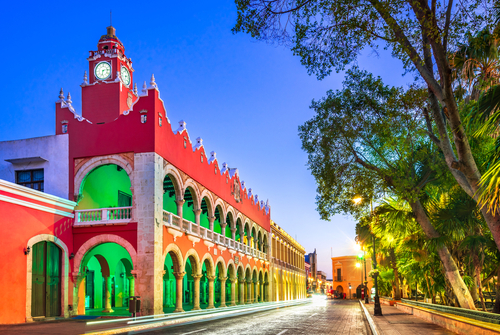
Colonial cities like Merida are popular with expats for their charm and affordable coat of living.
©Shutterstock.com/ecstk22
High-Quality Healthcare
Mexico’s healthcare system is renowned for offering high-quality care at a fraction of U.S. prices. Expats have access to both public and private healthcare options, ensuring flexibility and comprehensive coverage.
Private healthcare is particularly appealing for its short wait times and access to top-notch facilities. Doctor visits typically cost $30 to $60, while specialist services are available for $50 to $100 without the need for referrals. Major medical procedures, such as orthopedic surgeries or dental implants, are priced 50%–70% lower than in the U.S., making private healthcare an excellent option for expats seeking quality care.
The public healthcare system, known as IMSS, provides another affordable alternative for legal residents. For an annual fee of $400 to $600, IMSS covers essential medical services, including doctor visits, prescriptions, and hospital stays. While wait times may be longer compared to private facilities, many expats combine public and private coverage for a balanced approach.
For those seeking comprehensive care, private health insurance plans are available, ranging from $1,500 to $3,000 annually, depending on age and coverage. These plans grant access to private hospitals and additional benefits, ensuring peace of mind for expats living abroad.
Expats can also take advantage of Mexico’s affordable pharmacy system, where many prescription medications are available over-the-counter at significantly reduced prices. Some expats even maintain U.S. healthcare coverage for emergencies while using Mexican healthcare for routine needs, striking a practical balance between cost and accessibility.
Living Well in Mexico
With its low cost of living and accessible, high-quality healthcare, Mexico offers expats an excellent quality of life without the financial strain found in many other countries. By strategically choosing your location, managing expenses wisely, and taking advantage of Mexico’s healthcare system, you can create a lifestyle that combines comfort, affordability, and cultural richness in this vibrant country.
Practical Steps for Moving to Mexico
Mexico’s diverse regions offer something for everyone, whether you’re drawn to bustling cities, artistic enclaves, serene lakesides, or beach paradises. Selecting the right location involves research, personal reflection, and hands-on exploration to ensure your new home aligns with your lifestyle and priorities.
Mexico City stands out as a hub of culture and modern living. This sprawling capital is known for its world-class museums, vibrant nightlife, and international dining scene. It’s an ideal choice for professionals, families, and culture enthusiasts seeking an urban lifestyle with endless opportunities for entertainment and enrichment. Neighborhoods like Roma and Condesa exude trendy, cosmopolitan vibes, Polanco caters to luxury living, and Coyoacán offers a quieter, artsy environment perfect for those who prefer a more laidback pace.
San Miguel de Allende attracts those looking for colonial charm and cultural richness. This UNESCO World Heritage site, with its cobblestone streets and thriving art community, is particularly appealing to retirees, artists, and anyone seeking a slower, more reflective pace of life. The city’s vibrant art scene, paired with its historical significance, creates a unique blend of tradition and creativity.
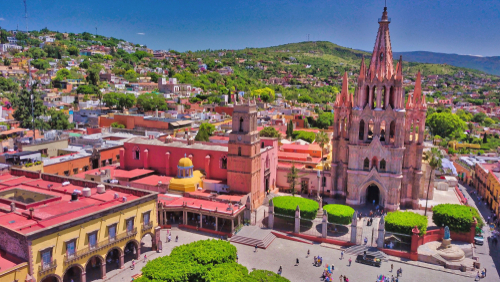
Artsy and colorful, San Miguel de Allende has been attracting expats for decades.
©Shutterstock.com/saltre
For beach lovers, Playa del Carmen and Tulum provide sun-soaked escapes with a laidback atmosphere. Playa del Carmen offers affordability and strong infrastructure for remote work, making it a favorite among digital nomads and young professionals. Tulum, on the other hand, delivers a boutique, bohemian experience with a focus on eco-tourism and wellness. Both locations boast stunning beaches, a vibrant social scene, and easy access to co-working spaces and reliable Wi-Fi.
If tranquility and community are your priorities, Lake Chapala is a serene retreat perfect for retirees and those seeking an easy integration process. Known for its pleasant climate, picturesque lakeside views, and a large, well-connected expat community, the area offers a peaceful lifestyle with plenty of social opportunities. From casual meetups to organized groups, Lake Chapala fosters a welcoming environment for newcomers.
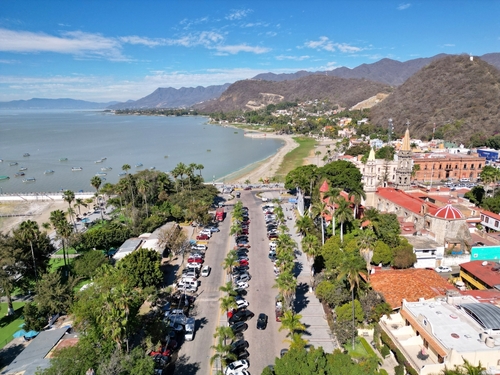
Lake Chapala has a large expat community, drawn here by the lake’s tranquility.
©Shutterstock.com/
Pro Tips for Choosing Your Location
Before committing to a long-term move, consider renting a short-term property or an Airbnb in your top-choice locations. Spending a month in each area allows you to explore its culture, amenities, and weather firsthand. Additionally, prioritize accessibility to key services like hospitals, airports, and grocery stores to ensure your daily needs are met comfortably.
By aligning your personal preferences with the unique offerings of Mexico’s diverse regions, you’ll find the perfect place to call home, setting the stage for a fulfilling and enriching life in this vibrant country.
Securing Visas
If you’re planning to live in Mexico long-term, obtaining the right residency visa is essential. Mexico offers two main types of visas, each designed to suit different needs and circumstances.
The Temporary Resident Visa is valid for up to four years and is a popular choice among expats looking to explore life in Mexico before committing to permanent residency. To qualify, applicants must demonstrate a monthly income of at around $3,700 or savings/investments of $62,300 (these figures vary, depending on the exchange rate), making it accessible for those with a steady income or financial cushion.
For individuals ready to settle in Mexico indefinitely, the Permanent Resident Visa is ideal. This visa does not expire, eliminating the need for renewals. It’s particularly attractive to retirees or individuals with higher incomes, as the requirements are often tailored to those receiving pensions or other stable financial support.
The process for obtaining either visa begins in your home country at a Mexican consulate. You’ll need to submit essential documents, including proof of income, a valid passport, and photographs. Once your application is approved, you’ll enter Mexico with your visa and complete the final steps at a local immigration office within 30 days. This involves finalizing your residency status and obtaining your official residency card, granting you legal long-term status in the country.
Navigating the application process can feel overwhelming, especially if you’re unfamiliar with the requirements or Spanish. Hiring an immigration lawyer or facilitator can streamline the process, ensuring that your paperwork is correctly prepared and submitted. It’s also important to allow plenty of time, as securing consulate appointments and completing the necessary steps can take several weeks or even months.
With careful preparation and a clear understanding of the requirements, securing a residency visa is a manageable step toward establishing your life in Mexico. Whether you’re exploring the possibilities or ready to make the move permanent, the right visa will provide the foundation for a seamless and enriching experience.

Sign up to Overseas Dream Home now, and Discover The Best Places in the World to Buy Real Estate 2025.
Enter your email now to download The Best Places in the World to Buy Real Estate in 2025.
You’ll also start receiving your free Overseas Dream Home eletter in your inbox every day!
No-spam pledge: We value your privacy. You can unsubscribe at any time.
Finding Housing
Securing a home in Mexico becomes a straightforward process when you have clear goals and use reliable resources. Whether you plan to rent or buy, understanding the market and leveraging local expertise will help you find a place that aligns with your lifestyle and needs.
Renting is an excellent option for newcomers, especially those who want to explore different areas before settling down. Short-term leases through platforms like Airbnb or Vrbo are a convenient way to familiarize yourself with neighborhoods while maintaining flexibility. Monthly rents in smaller towns typically range from $400 to $800, while larger cities or tourist hotspots often start at $1,000. Be prepared to provide proof of income and references, as landlords commonly request these documents to verify potential tenants.
For those interested in purchasing property, working with a bilingual real estate agent who specializes in assisting expats is highly recommended. An experienced agent can help you navigate legal requirements, particularly for properties in restricted zones near the coast or international borders, where a fideicomiso (bank trust) is required. This trust allows foreigners to legally own property in these areas while complying with Mexican regulations. Popular platforms for real estate searches include Vivanuncios, Point2Homes, and expat-focused Facebook groups with dedicated property sections.
When searching for a home, it’s essential to visit properties in person before making any commitments. Neighborhoods in Mexico can vary significantly even within a few blocks, so firsthand experience is crucial to understanding the area’s character, amenities, and suitability for your lifestyle.
By combining thorough research, local expertise, and personal exploration, you can confidently find the perfect home in Mexico, whether you’re renting temporarily or investing in a property to call your own.
Setting Up Utilities and Banking
Organizing utilities, opening a bank account, and navigating transportation options are key steps in establishing a seamless routine when living in Mexico. These practical arrangements ensure a smooth transition and help you settle comfortably into your new environment.
Setting up utilities like water, electricity, and gas is straightforward with the required documentation. Typically, you’ll need your lease agreement, residency visa, and a photo ID to register for these services. Internet providers such as Telmex and Izzi offer reliable plans ranging from $20 to $40 per month, often bundled with cable TV for added convenience. Having these utilities in place ensures your home is functional and comfortable while also providing proof of address, which is often required for other administrative processes.
Opening a local bank account simplifies financial transactions such as paying rent, utilities, and mobile bills. Popular options for expats include BBVA, Banorte, and Santander. To open an account, you’ll need a residency visa, your passport, and proof of a local address, such as a recent utility bill. A local account not only streamlines payments but also offers better access to local financial services, helping you manage your expenses more efficiently.
Transportation in Mexico is affordable and efficient, though the best option depends on your location and lifestyle. In cities like Mexico City, Guadalajara, and Monterrey, extensive metro systems provide a convenient way to get around, with fares as low as $0.50 per ride. For intercity travel, long-distance buses offer comfortable connections between destinations, with tickets starting at $10 to $30. Ride-sharing services like Uber, Didi, and Cabify are widely available in urban areas, offering a reliable and cost-effective alternative to traditional taxis.
For those living in rural areas or traveling frequently, owning a car may be the most practical choice. However, it’s important to purchase Mexican car insurance, as U.S. policies do not cover accidents in Mexico. While tourists can drive using their foreign licenses, long-term residents must obtain a Mexican driver’s license to remain compliant with local laws.
By setting up utilities, banking, and transportation, you’ll create a strong foundation for your new life in Mexico. These steps will not only simplify your daily routine but also allow you to focus on enjoying the unique opportunities and experiences the country has to offer.
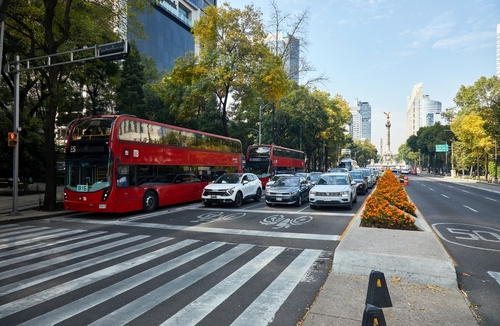
Getting around Mexico using public transport is possible and affordable.
©Shutterstock.com/Santiago Castillo Chomel
Navigating Life in Mexico
If you’re relocating to Mexico with children, understanding the education system is an essential part of planning your move. Families have a range of options to ensure their children receive a quality education that meets their needs. Public schools in Mexico are free for residents, but they often face challenges such as larger class sizes and limited funding. Instruction is primarily in Spanish, which may present difficulties for children who are not yet fluent in the language.
For families seeking alternative options, private and international schools offer high-quality education with curriculums in English or other languages, including the International Baccalaureate (IB) and American standards. Tuition fees for these schools typically range from $5,000 to $15,000 per year. Cities like Mexico City, Guadalajara, and Monterrey host some of the country’s top international schools, making them popular destinations for expat families. Applying early is highly recommended, as spots in international schools often fill quickly due to high demand.
Safety is another important consideration for expats moving to Mexico, and experiences can vary widely depending on the region. Cities such as Mérida, San Miguel de Allende, and Querétaro are well-known for their low crime rates and welcoming communities, making them attractive options for those prioritizing safety.
To stay secure, it’s important to take practical precautions. Avoid traveling alone at night in unfamiliar areas, and opt for ride-sharing apps like Uber or Didi instead of hailing taxis on the street. Staying informed about local news and developments in your area is also key to understanding and navigating safety concerns. Registering with the U.S. embassy or consulate through the Smart Traveler Enrollment Program (STEP) can provide you with valuable safety alerts and updates tailored to your region.
By planning carefully for education and staying vigilant about safety, you can create a positive and secure experience for your family in Mexico. These steps ensure you’re prepared to settle in confidently and enjoy all the opportunities the country has to offer.
Financial Considerations
Understanding the tax system in Mexico is a crucial aspect of managing your finances, particularly if you’re working, earning rental income, or own property in the country. Familiarizing yourself with the key tax requirements will help you stay compliant while maximizing any benefits available to expats.
Income tax in Mexico depends on your residency status. Residents are taxed on their worldwide income, while non-residents are only taxed on income earned within Mexico. For residents, tax rates range from 2% to 35%, depending on income levels, while non-residents face rates of 15% to 30%. Determining your residency status is vital, as it directly impacts your tax obligations.
Property taxes in Mexico are exceptionally low, averaging just 0.1% to 0.3% of a property’s assessed value annually. This affordability makes owning property in Mexico far less expensive compared to many other countries, adding to its appeal for expats.
Mexico also applies a Value-Added Tax (VAT) of 16% to most goods and services. This tax is automatically included in prices, making it easy to manage as part of your regular expenses.
Given the complexities of international taxation, consulting a bilingual tax advisor is highly recommended. A knowledgeable professional can help you navigate double taxation agreements between Mexico and the U.S., ensuring you meet obligations in both countries while avoiding unnecessary tax burdens.
By staying informed and seeking expert advice when needed, you can confidently manage your taxes in Mexico and focus on enjoying your life abroad. A proactive approach to understanding the system will ensure you’re well-prepared to meet all requirements while making the most of your financial situation.
Banking in Mexico
Opening a local bank account in Mexico is a practical step for managing your finances and streamlining tasks like paying bills, transferring funds, and making everyday purchases. A Mexican account provides access to local banking services, making life easier for expats adjusting to their new surroundings.
Expats often choose banks like BBVA, Banorte, and Santander, which are well-known for their accessibility and services. These banks have branches in most cities and offer a range of accounts to suit different needs. To open an account, you’ll need a residency visa, your passport, and proof of a local address, such as a utility bill. These documents ensure compliance with Mexican regulations and provide the necessary verification for account setup.
While a local account is invaluable for managing daily expenses, keeping a U.S. bank account open is advisable. This allows for large international transactions, emergency funds, or maintaining financial ties to your home country. A dual-banking approach offers flexibility and ensures you’re prepared for various financial needs.
Setting up banking in Mexico is a straightforward process that provides convenience and financial stability as you settle into your new life. With the right setup, you’ll be well-positioned to handle your finances seamlessly, whether locally or internationally.
Cost of Relocation
Relocating to Mexico comes with several upfront expenses, and planning ahead can make the process smoother and more manageable. Being aware of these costs ensures you’re prepared for the financial aspects of your move, allowing you to focus on settling into your new home.
Visa applications are one of the first expenses to consider. Depending on the type of residency visa you’re applying for, costs typically range from $300 to $700. This fee covers the application process and associated administrative requirements.
Renting a home in Mexico often requires an initial deposit of two to three months’ rent upfront. This can vary depending on the landlord and location, so it’s essential to budget accordingly when choosing your accommodation.
Shipping costs for moving furniture and personal goods can add up quickly, especially if you’re relocating from a distant country. Downsizing before your move can save you thousands by reducing the volume of items you need to transport. Many expats find it more economical to sell or donate bulky furniture and purchase new or secondhand items once they arrive in Mexico.
To ensure financial security during the transition, it’s wise to maintain a savings cushion of at least three months’ living expenses. This safety net can cover unexpected costs, such as additional deposits, unforeseen travel needs, or initial setup expenses, giving you peace of mind as you settle in.
By understanding and planning for these relocation costs, you’ll set yourself up for a smoother move to Mexico. A proactive approach ensures you can comfortably navigate the financial aspects of starting your new life abroad.
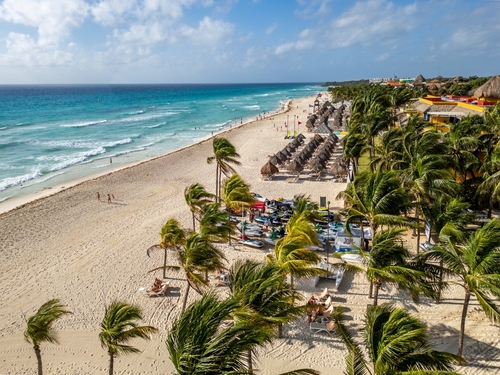
Whether you decide to live in a big city or by the beach in Mexico, you’ll find plenty of welcoming communities here. ©Shutterstock.com/feelthedrone
Frequently Asked Questions About Moving to Mexico
Relocating to Mexico offers the opportunity for a vibrant new lifestyle, but preparation is key to a smooth transition. From learning Spanish to understanding costs and following a comprehensive checklist, careful planning will set you up for success in your new home.
Do You Need to Learn Spanish?
While it’s possible to navigate life in Mexico using English, especially in tourist hubs and expat communities, learning Spanish greatly enhances your experience. Basic Spanish makes daily interactions smoother, helps build connections with locals, and enriches your cultural immersion. Apps like Duolingo, Babbel, and Rosetta Stone are excellent for building foundational language skills, while local classes provide structured learning and the chance to meet other expats. Practicing conversational Spanish with locals in markets, cafes, or at social events helps reinforce what you’ve learned. Engaging with Spanish-language media, like TV shows and podcasts, also improves comprehension. Start with simple phrases for greetings, ordering food, and asking for directions—locals will appreciate your effort, even if your Spanish isn’t perfect.
The Cost of Living Compared to the U.S.
Mexico’s lower cost of living makes it a popular destination for retirees, remote workers, and expats seeking affordability without sacrificing quality of life. Housing costs are a significant saving, with one-bedroom apartments in city centers ranging from $400 to $800, compared to $1,200 or more in the U.S. Groceries and fresh produce from local markets are 30%–50% cheaper, and dining out at mid-range restaurants typically costs $10 to $20 per person. Healthcare is another area where expats save, with high-quality medical care priced 50%–70% less than in the U.S. Routine doctor visits and procedures are affordable even without insurance, and prescription medications are also significantly cheaper. To maximize savings, consider shopping at local markets, dining at neighborhood restaurants, and living in smaller cities like Mérida or Guanajuato, where rents and daily expenses are lower than in tourist destinations or metropolitan areas.
Moving to Mexico: Your Checklist
Before the Move:
Research potential cities and neighborhoods by evaluating factors like climate, cost of living, and safety. Visit or stay short-term in your top choices to get a feel for the lifestyle before committing. Begin your residency visa application at a Mexican consulate, ensuring you have all required documents, such as proof of income, photos, and your passport. Budget for initial expenses like rent deposits, visa fees, and flights, and plan for short-term accommodation and setting up utilities. Familiarize yourself with essential Spanish phrases, enroll in an online course, or practice with language apps to build confidence. Explore healthcare options, comparing Mexico’s public and private systems, and select a health insurance plan that fits your needs. If you’re moving with pets, ensure vaccinations and entry documentation are up to date. Notify your bank of the move, research currency exchange options, and verify that your debit and credit cards will work internationally.
After Arrival:
Start with short-term housing to explore neighborhoods before committing to a long-term rental or purchase. Reliable platforms like Vivanuncios, Airbnb, or expat Facebook groups are good starting points. Register for utilities such as water, electricity, and gas, and set up internet with local providers like Telmex or Izzi. Open a local bank account at institutions like BBVA or Banorte with your visa, passport, and proof of address. Register with your local consulate or embassy for emergency assistance and to stay informed about your rights as an expat. Join expat groups and local clubs to build a support network and gain valuable advice from those with similar experiences. Explore your neighborhood to locate grocery stores, pharmacies, hospitals, and other essential services. Familiarize yourself with public transportation or ride-sharing apps for urban travel, and consider securing a driver’s license if you plan to own a car.
Ongoing Integration:
Immerse yourself in Mexican culture by attending festivals, markets, and local events. Consider workshops or cooking classes to learn about traditions and cuisine. Regularly practice Spanish to improve your communication and connection with the community. Set up healthcare by enrolling in the public IMSS system or choosing a private clinic or doctor for routine care. Ensure you meet any tax or legal obligations by consulting with a professional, especially if you have income or assets in your home country.
By following this guide, you’ll navigate the challenges of moving to Mexico with confidence, laying the groundwork for a fulfilling and enriching life in this vibrant and diverse country.
Your New Life Awaits in Mexico
Relocating to Mexico opens the door to a life filled with adventure, cultural discovery, and meaningful connections. Whether you’re drawn by the affordable cost of living, the warmth of its communities, or the richness of its traditions, Mexico offers a unique opportunity to create a lifestyle that aligns with your dreams.
With thoughtful planning, a spirit of exploration, and an openness to embrace the local way of life, your move to Mexico can become a transformative journey. From vibrant cities to serene beaches and charming villages, there’s a place for everyone to call home.
Now is the time to take the next step and make your vision a reality. Begin your Mexican adventure and discover the beauty, culture, and community that await you in this remarkable country.

Sign up to Overseas Dream Home now, and Discover The Best Places in the World to Buy Real Estate 2025.
Enter your email now to download The Best Places in the World to Buy Real Estate in 2025.
You’ll also start receiving your free Overseas Dream Home eletter in your inbox every day!
No-spam pledge: We value your privacy. You can unsubscribe at any time.